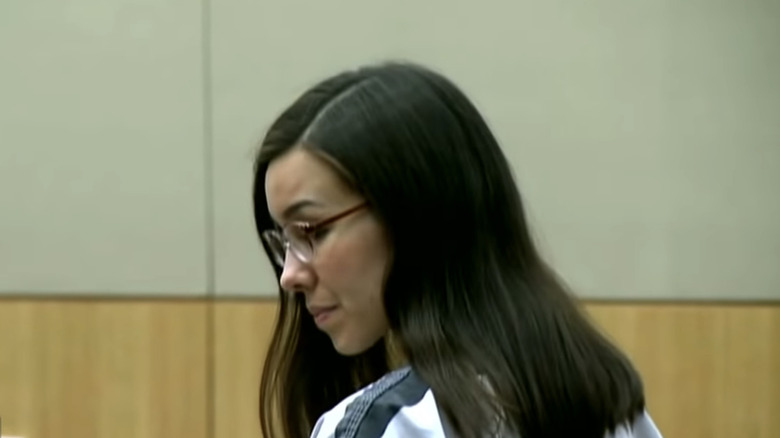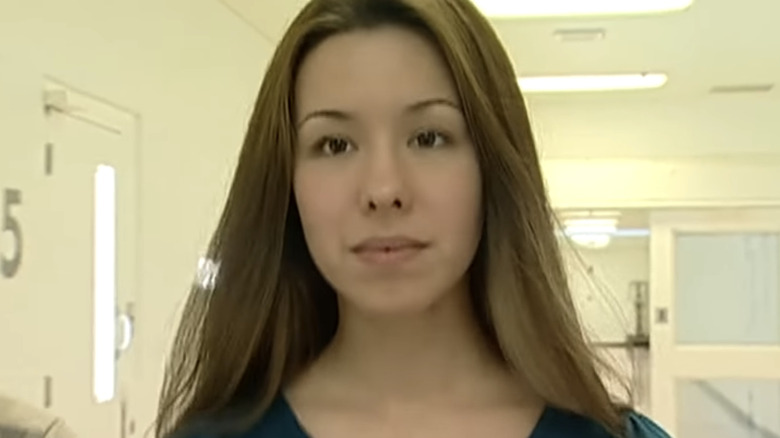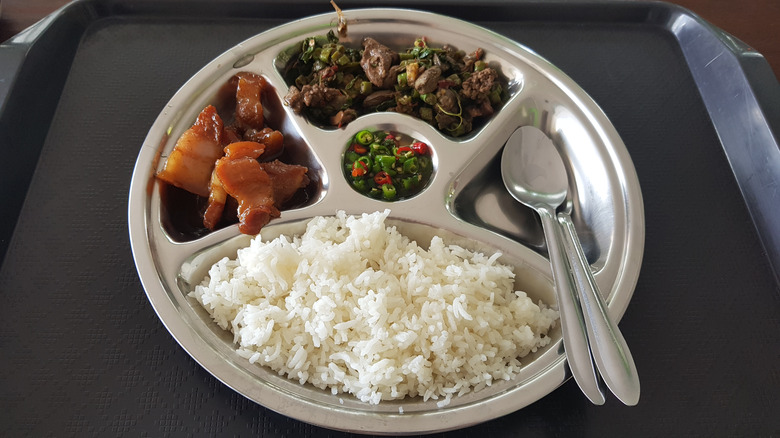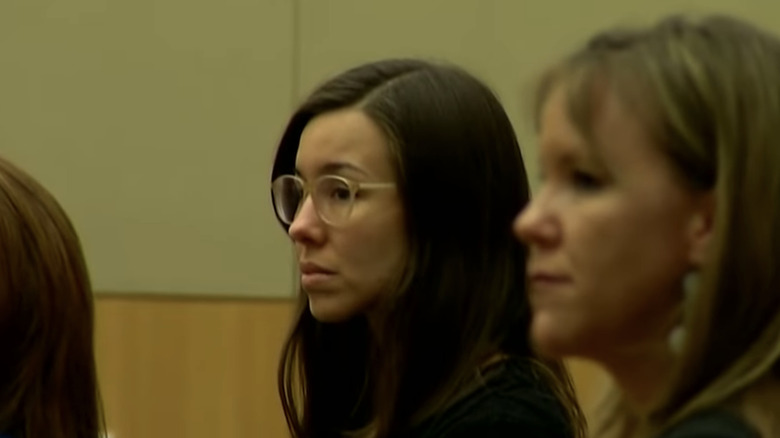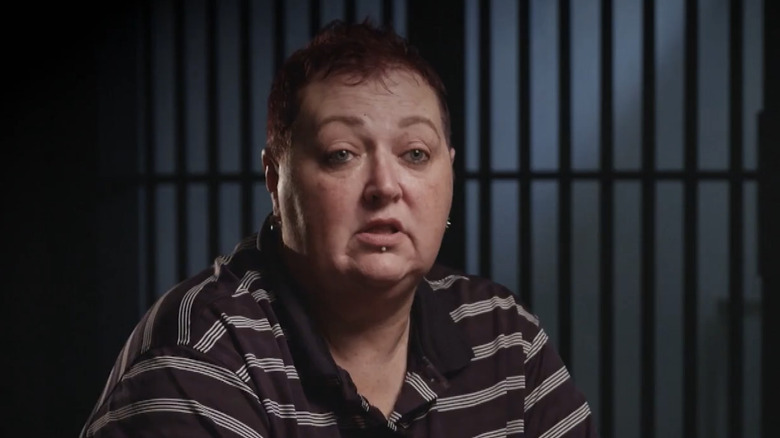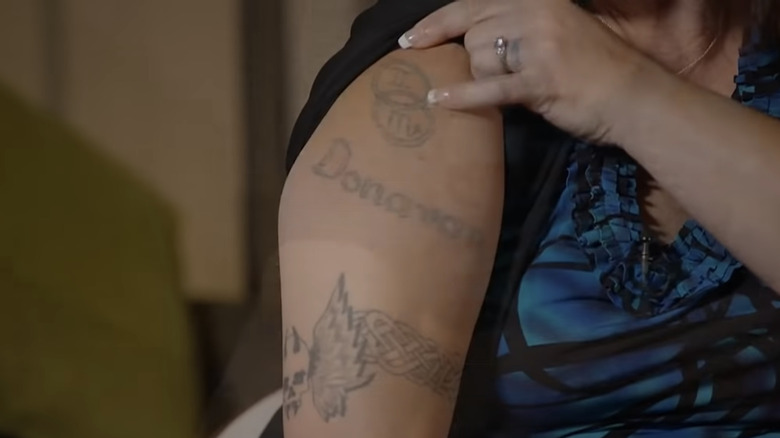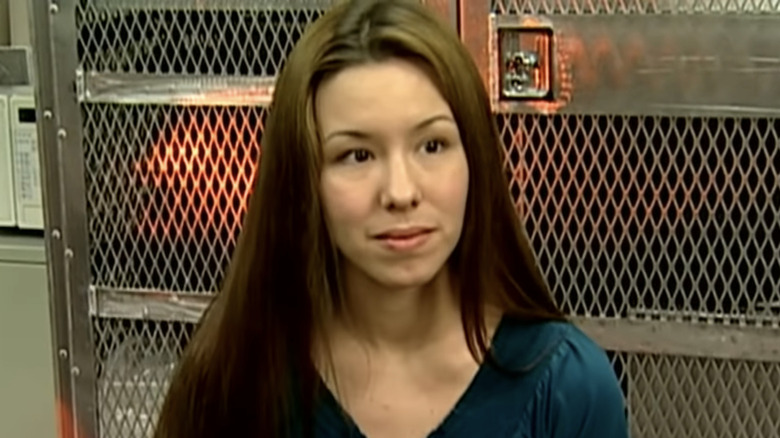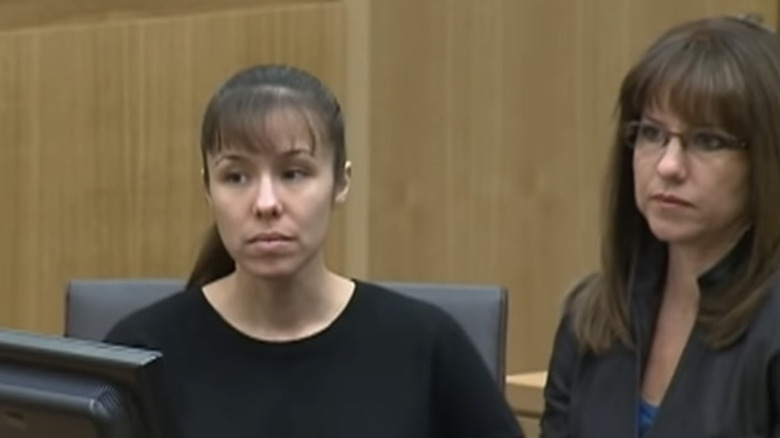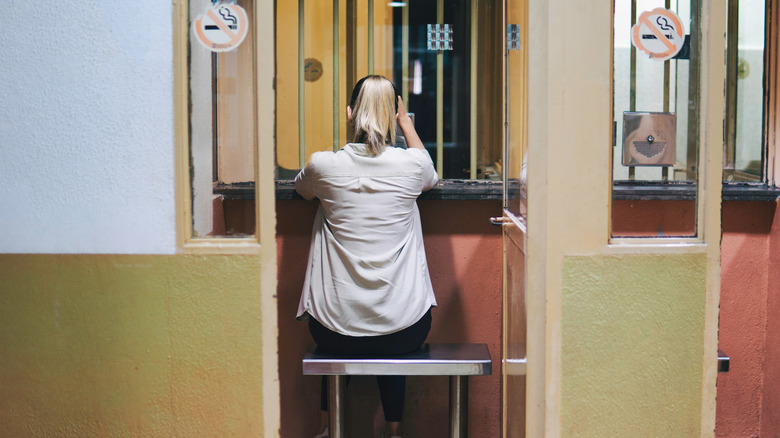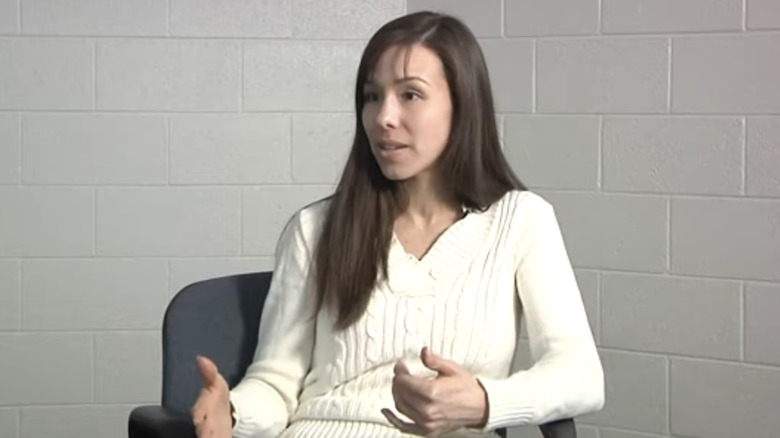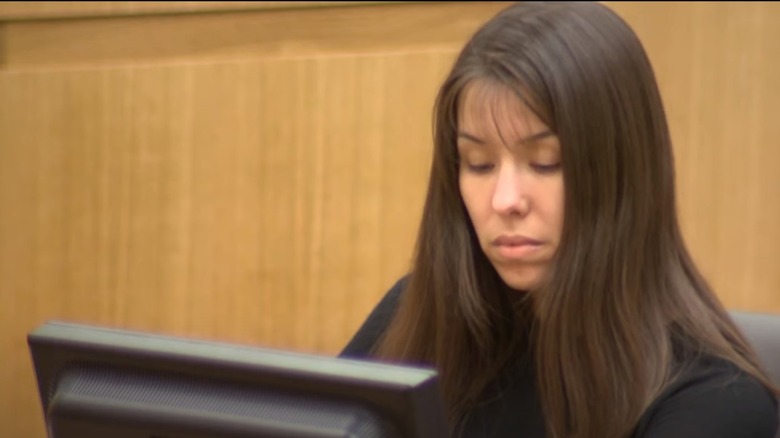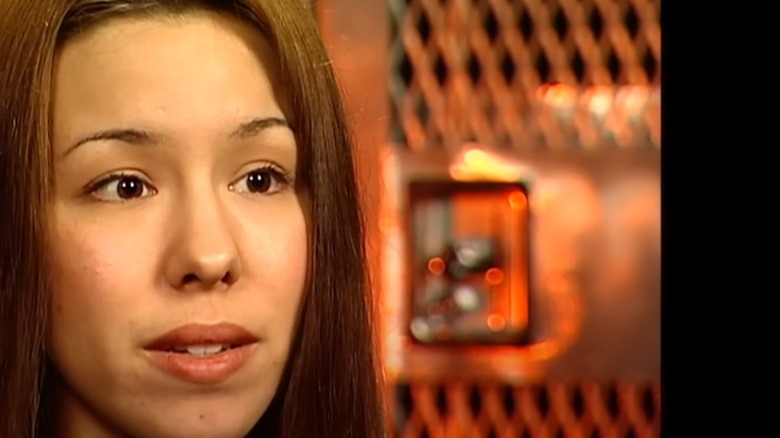What Jodi Arias' Life In Prison Is Really Like
While all murders are horrific in nature, there are those that stand out as exceptionally gruesome, like the killing of Travis Alexander. In 2008, the victim was brutally stabbed 27 times and then shot in the head by his ex-girlfriend, Jodi Arias.
The crime was so shocking that it spawned headlines from media outlets across the nation and made the killer notorious, after she was convicted of first-degree murder in 2013. And her infamy only increased after the release of the Lifetime film, "Jodi Arias: Dirty Little Secret," which soon became the most successful true crime flick on the network.
Even after years behind bars, Arias still receives a decent amount of media attention. This is partly due to the information she releases herself, but also because of the unsettling details that have been made public about the interactions she has had with individuals while locked up. These accounts of others and personal blog posts, on top of inmate files, all give a view into what her life in prison is really like.
She was transferred to a few different prisons
After Jodi Arias was convicted for the first-degree murder of Travis Alexander in May 2013, she was eventually moved to Perryville Prison in Goodyear, Arizona, to serve out her life sentence without the possibility of parole. And one of the more disturbing aspects of this location is that the facility is not even an hour away from her victim's hometown of Mesa, Arizona.
But before the move to her long-term confinement, Arias was transferred between a few different detention centers within the local prison system, including the Arizona State Prison Complex, the Estrella Jail, and the Maricopa County Jail.
It was at the Estrella location that she met her cellmates, Tracy Brown and Donovan Bering, and became friends with the two women — until they both realized that it was a mistake to form a close relationship with the convicted killer.
She was moved from maximum to close custody
It might not be surprising to hear that the first two years were some of the worst of Jodi Arias' long sentence. Initially, the convicted felon was held in maximum custody at Perryville Prison, and not only was the cell setting rather claustrophobic at 12 feet by 7 feet, but she was forced to remain there for 23 hours of the day. Arias was allowed to see visitors for two hours a week, yet these interactions were separated by thick glass.
Although she remained at Perryville, Arias was eventually put into the less restrictive close custody, where she could have cellmates again, as well as interact with the other prisoners in a group.
In the following years, the convict enjoyed increased freedom and kept busy working at her unit's library. Arias began the part-time gig as a library aide in 2018, whereas before that, she had the unpleasant task of scrubbing toilets. The new job came with a pay cut of 10 cents, but since she was only making 50 cents an hour anyway, the change definitely appeared worth it.
The food options are not all terrible
After rapper Kareem "Lefty" Williams produced a video about Jodi Arias, the two managed to get in touch via a phone call in 2016, which ended up being posted by RadarOnline. In the conversation, the felon provides a brief view of her life on the inside and admits that her situation is not always bad, especially when it comes to the food she is provided. And she usually gets a heads-up when her favorites are available, because there is a new menu posted every week.
However, Arias does make the options from Monday through Friday sound rather bleak, saying, "On the weekends they give us a hot dinner, on the weekdays it's like sandwiches. Nothing is very good." Yet, on the other hand, the cooked meals served at the end of the week seem like a real treat. She described some of the delicious offerings and said, "We had chicken fajitas here tonight. Really good." Arias then added, "A big old pile of caramelized onions, some bell peppers, like, all the works."
It did not end there, as she later described her breakfast with hash browns, bell peppers, onions, and cheese, along with buttered pancakes, syrup, cereal, fruit, and a sausage patty — all of which sound like a decent, well-rounded meal too. Just like with the dinners, Arias said the morning meals are always better on the weekends.
She has access to several TV channels and radio stations
While Jodi Arias may be physically prohibited from leaving the penitentiary, her exposure to information from the outside world is not as limited. In her recorded phone call with rapper Kareem "Lefty" Williams in 2016 (via RadarOnline), the convict revealed she can listen to any FM radio station that she wants, along with a long list of TV channels. The latter include Univision, Freeform, ABC, CBS, PBS, FOX, BET, CNN, TNT, USA, Lifetime, and A&E, along with a station focused on Brigham Young University, and two more for Catholics and Protestants.
On top of the regular TV channels, Arias mentions that she can also view some digital media, but her overall access to the internet has restrictions, and she seemed disinterested in those options anyway. However, in her recent comments on the website JodiAriasIsInnnocent.com, she does also talk about having her own tablet with a news app installed, so it appears that not everything online is blocked during her incarceration.
She has received a lot of criticism from the public
Being locked up was not as much of an isolating experience for Jodi Arias as it would seem, for her links to the outside world went beyond the consistent visitors, TV shows, and radio stations. In his conversation with Arias, Kareem "Lefty" Williams mentioned that he has received a lot of strong criticism and straight-up hateful comments over his video featuring the prisoner, and her supportive response was very telling about how she viewed her own situation regarding the public back in 2016 (per RadarOnline).
Arias first laughed it off and replied, "Oh yeah, haters are gonna hate." Williams then said that both of them might be two of the most hated people alive, so Arias responded by describing how her situation was the polar opposite, saying, "It's all good. If this is what it is like to be hated, then keep hating! I've had so much love coming in my direction I can't even respond to it now."
Friends help keep Jodi Arias active on social media
During the many years that Jodi Arias has spent locked up, her links to the world outside have often been quite solid because of help from friends. One particular connection with Donavan Bering (pictured above) was extremely helpful, because in 2013 Bering handled the numerous posts on all of Arias' social media accounts. During their interactions, Arias gave specific directions on exactly what to say and who to communicate with.
When asked by ABC News about why Bering sacrificed so much of her time and energy to assist Arias, she responded by saying, "I find it really hard to believe what happened, knowing her. Never, ever have I seen her raise her voice, seen her yell, seen her do anything."
However, Bering's opinion of Arias since soured, having witnessed her dark side through her manipulative behaviour. And it seems Arias has managed to find someone else to take Bering's place, because some years later, in 2018, prison officials were fully aware of her strong social media presence.
Art is a means to make cash on the inside
Possibly the most enriching way that Jodi Arias has used the internet, and her network of friends outside of prison, is through the selling of her artwork on her personal website, Art By Jodi Arias.
In her bio, Arias explains why she began to do so: "The act of creating art has been with me since I was old enough to hold a crayon and has remained a part of my life in varying degrees, from mere dabbling to blissful obsession." But she also admitted that her reasoning had to do with struggling while incarcerated, for she added: "I often felt hungry in jail, and my family could do little to financially support me, an adult who should have been feeding herself."
Paintings and drawings are not the only types of art that Arias has been paid for while behind bars. When interviewed by Inside Edition, Tracy Brown gave details on how her former cellmate worked as a tattoo artist for fellow inmates, and also showed off the tattoos that Arias had done for her.
She manipulates people in and out of prison
It took years before Donavan Bering and Tracy Brown realized Jodi Arias' true nature and then ended their friendship with her, so it was not until more recently that the two revealed what their former cellmate was like on the inside. When talking with "Inside Edition," Brown (pictured above) explained how Arias would manipulate anyone she could, including prison guards, fellow inmates, or even people outside of prison when possible. She then added, "She will use you to get what she wants, and when she's done with you, she will throw you away."
In the episode "Jodi Arias: Cellmate Secrets" (via "Inside Edition"), Bering certainly agreed about Arias, especially since she felt fooled into defending her for so long, even after witnessing what the felon was capable of. Bering said, "She got away with things that other inmates didn't get away with. She was a very attractive young girl who liked to flirt, and the male guards just ate it up."
Aside from Bering's dedicated social media management, Arias also benefited greatly from what she was able to obtain from the prison guards, including the means to perform her side hustle. Brown also said, "There were a couple officers, you know, she would flirt with and fly her hair with. And they would find the tattoo equipment, things you can get in trouble for."
She has received several perks while locked up
In the southern regions of the U.S., high temperatures can be extremely dangerous for prison inmates. In Arizona, where Jodi Arias is serving her jail sentence, the heat can reach over 120 degrees Fahrenheit, with conditions sometimes leading to hospitalizations and even deaths, as reported by The Daily Beast. Fortunately for Arias, however, she has often been provided with resources to mitigate the danger — and provide comfort that many other incarcerated individuals do not have access to.
Within the first few years of her incarceration, a post on Arias' website revealed that prison guards were supplying ice in a Styrofoam cooler for her to use with her fan (via RadarOnline). But after an unstable man announced that he would attempt to break her out of confinement, in 2021, Arias was moved to another cell with the luxury of air conditioning.
Over the years, Arias has had access to other perks too, such as a respectable collection of magazines, and has been allowed to have some fashion options — such as a set of brand-new tennis shoes.
Her life has been threatened
Prison isn't easy, and there are plenty of incarcerated individuals who have had a far worse experience than Jodi Arias. However, that is not to say that her life has been pleasant either, with probably the worst aspect being the terrifying threats that have been made against her.
In 2015, Arias was sent a letter that was confiscated before it reached her, which warned that there was a plot to hire an inmate to harm her. Then, in the following year, Arias claimed (via 12News) another inmate was heard yelling at her, "I'm going to [expletive] kill you [expletive] the same way you killed [redacted name]."
Six years later, in 2021, another event occurred that was more bizarre than life-threatening: A man whom Arias had never met before decided that he was going to rescue her from prison — and was caught in the process. For her safety, Arias was moved to a more secure location, and was forced to pause daily activities she enjoyed, like working at the library. But it wasn't all bad — she did get air conditioning in the new cell.
She took steps to get married
While Jodi Arias was on trial for the brutal murder of Travis Alexander, in 2012, a wealthy art collector named Ben Ernst somehow became smitten with her from afar. Even though he was already dating another woman, Ernst and Arias began communicating, as one of his friends told In Touch, "They quickly became buddies and eventually were talking on the phone about three times a week."
By 2016 Arias had been convicted, and yet the couple had become so serious that Arias began to make plans for their wedding — and even a child. But her imprisonment was a major obstacle, so she wrote a letter to her friend and mitigation specialist, Maria De La Rosa, that said: "Ben can't come visit. So, here's what he needs to do. If we marry, then he can petition a court to grant us visitation,"
Ultimately, the marriage did not happen, yet that did not stop her boyfriend from making many visits to see her in the following years. In 2019, the visitors' logs obtained by RadarOnline revealed that Ernst still went to see Arias several times a month. Although conjugal visits are prohibited in the Arizona prison system, the visits were likely intimate nonetheless, for some were several hours long.
Her visitor restrictions were lessened
After Jodi Arias' sentencing, her visitor privileges were extremely limited. Not only were the visits no-contact with a glass wall in between, but she was only allowed to have two hours a week with her guests. Furthermore, her list of approved visitors was limited to 20, and each one had to both pay a fee and pass a background check to see her.
In 2016, Arias excitedly talked about how she would soon have contact visits in her phone call with Kareem "Lefty" Williams. Ever since, she has often had guests, and most of them are not a surprise. According to the visitors' logs obtained by RadarOnline, her mother, Sandra, and her brother and sister — Joseph and Angela, respectively — have all come to Perryville to see her, on top of the frequent visits of boyfriend Ben Ernst.
On the other hand, one of Arias' visitors does stand out as more than a little strange: Marc McGee, a friend of Travis Alexander — the man she was convicted of murdering — was another individual with an entry in the log.
Her legal team has failed with appeals
In 2020, reports of misconduct and sexual harassment from prosecutor Juan Martinez were so egregious that they led first to his firing, and then disbarment in July. Since he was the attorney in Jodi Arias' trial, her legal team quickly seized the opportunity and appealed the court's decision. Not only was it revealed that Martinez had given the identity of a juror on the case to a blogger he was sleeping with, but Arias' lawyers also argued that the judge didn't do enough to control the media coverage, depriving her of the right to a fair trial.
While the Arizona Court of Appeals was critical of Martinez's behavior, the ruling made it clear that it had nothing to do with the outcome of the murderer's case. The statement read: "We conclude that Arias was convicted based upon the overwhelming evidence of her guilt, not as a result of prosecutorial misconduct" (via AP). The ruling also added: "We strongly disapprove of his actions; we are compelled to follow the well-established principle that we do not 'reverse convictions merely to punish a prosecutor's misdeeds.'"
The failure of the appeal, on top of there being no chance for parole, means that Arias will likely continue living in similar conditions as she does now for the entirety of her life sentence.
She received several disciplinary actions
In 2015, Jodi Arias was imprisoned under the watchful eye of Arizona sheriff Joe Arpaio. (That name should definitely sound familiar: Elected to the Maricopa County office in 1992, he's long billed himself as "America's toughest sheriff," until his career hit a series of accusations and charges that ended up putting him in a position to require a pardon from President Donald Trump.) Arpaio and Arias made joint headlines when it was announced that he had cracked down on her previously-enjoyed privileges, banning some visitors and phone calls, along with suspending her access to the commissary.
Arpaio said that she had been found violating prison rules in a few ways: She was accused of communicating with minors, skirting monitoring regulations by passing messages through other inmates, and having visitors that also violated policy in various ways, including using fake names. Arpaio made his position clear, saying (via CBS News): "Arias needs to understand that while she is in my jail, she is to obey all the rules and breaking them has consequences."
Arias was also reprimanded in 2016, and her privileges were revoked once again. This time, it was after calling a corrections officer an offensive name. The report (via ABC News) claimed that she had admitted using the X-rated term after being denied a haircut. Arias lost visitation privileges for about 200 days, in spite of her explanation that "other inmates talk that way all the time and [I] figured it was ok."
She took the grand prize in a Christmas singing contest
It's easy to overlook just how slow the arrest, trial, and sentencing of Jodi Arias was. After being arrested in 2008, she wasn't convicted until 2013. In between, she was held in facilities overseen by Arizona's Maricopa County sheriff Joe Arpaio, and it's worth saying that for starters, the food was almost unthinkingly bad. Female inmates went on a hunger strike in 2014 in protest of the dire food conditions, and the year before, he made headlines for serving a 56-cent Thanksgiving dinner. That might explain why, in 2010, Arias literally sang for her supper.
The performance (pictured) came during what AZ Central described as "a reality-show-type singing contest at his jails," and the prize was an actual Christmas dinner — complete with turkey, trimmings, and cookies. Arias hadn't yet reached the infamy that she would later achieve so it sort of flew under the radar when it happened, but her rendition of "O, Holy Night" ended up impressing the judges and taking the top spot. Recordings have been made public, and they were broadcast throughout the entire jail on that Christmas. It wasn't a punishment, either: She's almost surprisingly good.
She keeps in touch with pen pals and visitors
In addition to keeping in touch with former cellmates, Jodi Arias is also allowed regular mail and visits from people she's struck up a relationship with via letters. In 2015, Feminine Collective columnist Dori Owen wrote about going to visit Arias after having exchanged letters for a time. She said that she ended up visiting regularly, and stressed that they didn't discuss her case. Instead, they swapped book and author recommendations, and even formed their own private book club. Owen wrote, "The only Jodi I know is the one I see for 30 minutes every few weeks. I still hold on to my belief that it is not my role to judge, but rather to be an extremist offering love and small kindnesses."
Others have gone public with the beliefs they developed after writing or chatting with her. A man identified only as Jake appeared on HLN's Nancy Grace, and said that after four years of exchanging regular letters, he'd come to the conclusion that she'd only killed in self-defense.
Not all interactions have gone smoothly, though. In 2019, the Daily Mail got copies of a notice where one visitor was banned after attempting to smuggle contraband — alcohol-soaked pads — into Arias. Steve Joyner reportedly struck up a friendship with her while she was in jail, and was one of 20 people that she had named on a list of people she would accept visits from. According to the Arizona Department of Corrections, she wasn't reprimanded in the incident.
